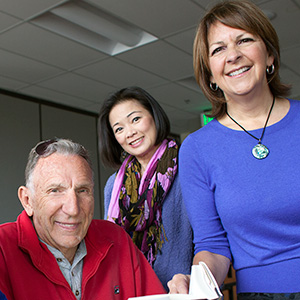
‘Chicago’ Wayne Sander with Osher Presenter Marivi Soliven and Instructor Susan McBeth.
“Chicago” Wayne Sander’s upbringing in a Midwestern Mississippi River town to a blue-collar family that valued hard work and skilled labor over higher education gave no indication that one day he would excel at not only higher education, but education for pure intellectual recreation.
“The narrative I grew up believing was that college and university was for spoiled rich kids who were too lazy – and probably incompetent – to earn an ‘honest living,’” said Sander. As such, he put in only enough effort to maintain a C average in high school. “Seven years later, with a wife and two small children, working a seven-day rotating shift in a chemical factory, the truth regarding the value of education finally revealed itself. Without the benefit of further education, I was destined to a lifetime of relatively mindless work, employing a biorhythm-destroying schedule that was only sustainable with copious quantities of black coffee and Alka-Seltzer.”
So with only one high-school science class and minimal math under his belt, Sander concluded that the way out was a degree in engineering. “As ridiculous as that aspiration now seems, we sold our little house, my treasured T-Bird and took our modest savings to embark on what most considered a fool’s errand,” he said.
Four and one-half years later, he proudly accepted his degree in mechanical engineering from San Diego State University, having worked full-time for all but one semester. He continued on to finish a graduate degree at night, while working as an engineer by day. Along the way, he decided that in his retirement, he’d like to return to campus, possibly as a part-time faculty member. He did in fact return – decades later – but again as a student, completing a second graduate degree at age 70.
“Directly following completion of that degree, I actually fulfilled my earlier aspiration by accepting a position as an affiliate professor in SDSU’s College of Engineering as part of a program called Project Lead the Way,” said Sander. “It’s where high-school science teachers are taught to teach introductory engineering classes as part of their curriculum. It’s also designed to attract female and minority students to the engineering field. A great program. It was during this on-campus exposure that I discovered the Osher program. It’s a virtual smorgasbord of educational offerings … a myriad of previously unexplored and surprisingly fascinating subjects. It’s also addictive.”
Addictive indeed. The Osher Institute at SDSU offers intellectual adventure for students age 50 and better, and Sander took his first course in the spring of 2006. He has since breezed through 195 more, on topics ranging from philosophy, history, and human aggression; to democracy, morality and musical theater.
“My first semester was incredible in the offerings and the level of instruction,” said Sander. “The three most memorable that semester were The Dawn & Twilight of Science, a four-session class by Bruno Leone, a spellbinding lecturer and concert pianist. Here is truly a world-class lecturer, the likes of which were absent in my previous exposure to higher education.
“Also offered that semester was a course entitled U.S. Supreme Court: Who Elected Them Anyway? by Gary LaFleur, a knowledgeable and gentle lecturer who destroyed my mostly negative stereotypical vision of attorneys.
“And an unforgettable course entitled Impolite Subjects; Sex, Religion & Politics by Rolf Schulze. It’s the only class I ‘had’ to repeat. A memory is indelibly etched in my mind. It was toward the last of the six-session course. One class member, a frail, stern-looking lady with her grey hair tied back in a bun, resembled a second-grade teacher I had – one that my grandfather had told me ‘She was an old lady when I was in the second grade.’ This widowed lady raised her hand and softly said, ‘You know, a one-night stand now and then is nice, but I really miss the continuing companionship of a committed partner.’ A really poignant sharing with our class by a woman whose name I can’t recall. One who earned my everlasting respect for both her bravery and for this program that allowed and encouraged her to crack open the window to our rarely shared humanity.”
Bravery. Humanity. Friendship. Camaraderie. Potlucks. Edventures. Even a reunion of long-lost college roommates. It’s all waiting to be found at the Osher Institute.
By the way, “Chicago” Wayne is not from Chicago. He chose the nickname as a result of his attempt to teach his wife’s infant grandson new words. The little boy found the word hilarious. “Each time he heard it, he nearly fell off his chair. But he also thought it was my name,” said Sander. “So in that family I became ‘Chicago.’ But because it’s distinctive and has three explosive syllables, I found it useful for dinner reservations where they call your name. In addition, hostesses and others – regardless of interaction frequency – never forgot your name.”
With or without the Chicago portion of his name, Wayne Sander has already become a legend at SDSU’s Osher Institute.